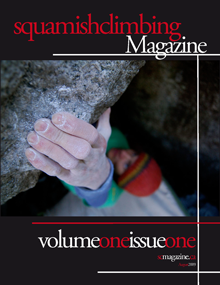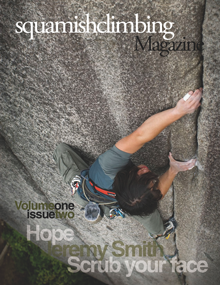To end a fantastic bouldering competition season in British Columbia, we thought it would be only fitting to interview climbing coach and mentor, Andrew Wilson. Andrew has long been a force in the competition scene, both in British Columbia and on a national level. With just under five years climbing experience under his belt, Andrew began his journey into the role of climbing coach 23 years ago at The Edge Climbing Centre in North Vancouver, BC. Along with his coaching partner, Mike Doyle, this team influenced a large amount of Canadian climbers including Sean McColl, Simon Parton, and Will Stanhope just to name a few.
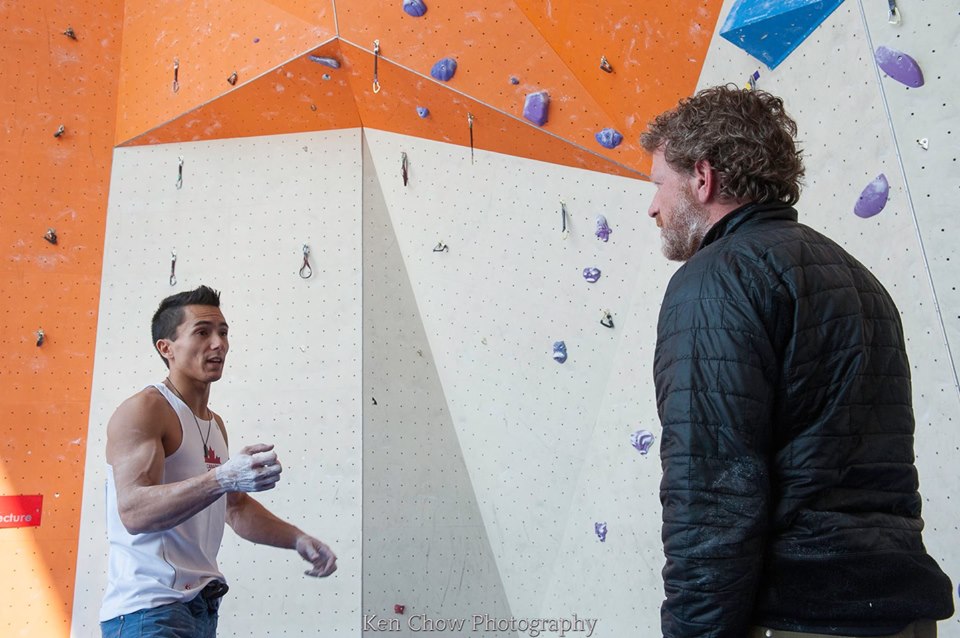
Andrew Wilson and Sean McColl at last year’s IFSC Climbing Camp. Photo courtesy of Ken Chow ©
This year, along with his new coaching partners Matt Johnson and Len Chong, the Climb Base 5 Open Adult Team was born, the first adult competition team in British Columbia. To start this interview, Andrew’s current coaching partner, Matt Johnson, was gracious enough to take over the introduction of Andrew to capture his influence over the years.
As a teen, I began climbing as a cool way to get stronger for mountain biking. I’d never found a connection in traditional sports teams so I chose to spend my Saturdays at the Edge Climbing Centre instead. I wasn’t on the football team but torn baggy jeans, long curly hair, tangled headphones and a Megadeth T-shirt were the only uniform I had ever needed. I still thought of myself as an athlete, I just didn’t have a team train with.
I remember watching a climber my age cruise his way up the most intimidating walls in the gym. I was awestruck by the ease, speed and fluidity with which he moved. After sticking an all points off dyno into the roof, spinning 180 degrees into a foot first sequence he casually positioned himself in a bat hang while clipping the final draws. My eyes were wide, my mouth visibly open in awe, I couldn’t understand how it was possible.
“You can move like that too, you know…” said a warm, calm and inviting voice.
I glanced over at an unfamiliar face briefly before my gaze returned to the climber high above .
“Like that!? “ I said , with a laugh. “I don’t think so…”
“Come join us next Monday” was his reply “You’re as strong as as you need to be, I’ll show you”
That voice beside me was Andrew Wilson, head coach of the Edge Climbing Team , circa 2003. I was 14 years old and for the 14 years since then, Andrew has been a mentor in climbing, coaching, positivity and relationships. As both a climber and an individual, Andrew opened my eyes to an inclusive world of sport, filled with optimism, passion, hard work, and laughter. Through a culture of athletic integrity, friendship, and connection, climbing connected me with the community of people I consider my closest friends as an adult. I’m fortunate to have come full circle on my youth climbing career and now work as coach and route setter myself. The last year saw quite a few things in my work life change, by far the most exciting of which has been the opportunity to work alongside my friend and mentor, Andrew Wilson. Together, in partnership with Climb Base5, we have formed the first Open Performance Climbing team in BC. This team continues support beyond the youth circuit for open athletes pursuing their climbing and competition goals. We’re fortunate to work with talented athletes open to these (sometimes) whacky approaches, and I feel we’ve got something pretty special going on with this team.
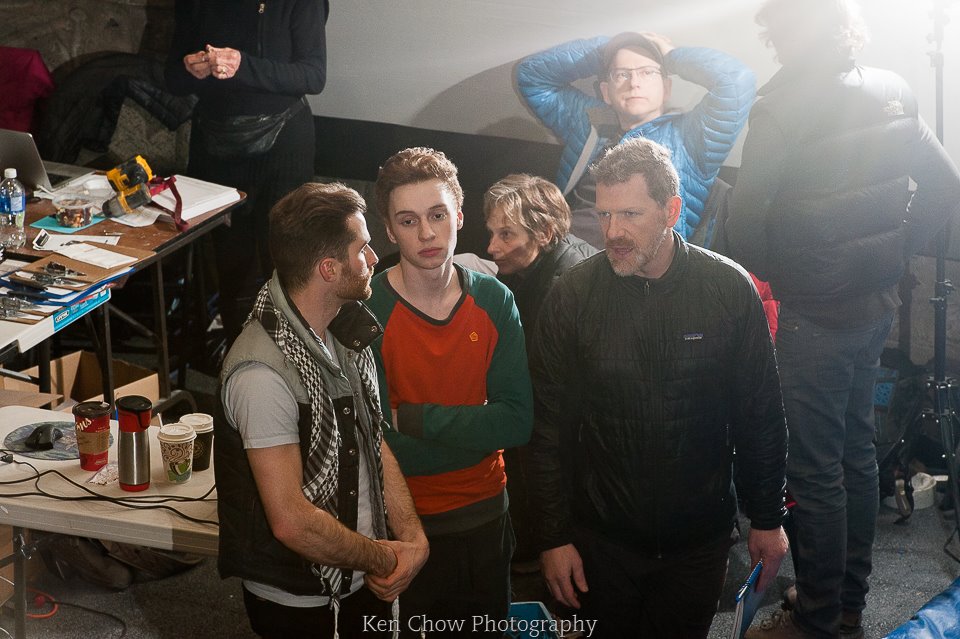
Andrew Wilson with Matt Johnson and Hamish Thompson. Photo courtesy of Ken Chow ©
With strong influence over this year’s competition season, a number of athletes from the Climb Base5 Open Team dominated the podium. In this interview, we get Andrew’s insight into this year and go deep into his training fundamentals. Here is what he had to say.
So the 2015-2016 Bouldering season has come to an end. How did you feel seeing Alannah Yip on the podium after coaching her for so many years?
It was great! She has been very committed to taking another step forward this season. It is nice to see it come to fruition. I’m really happy for all my athletes. Although some had disappointing results, they have all grown as athletes and people and have built great foundations to continue moving forward.
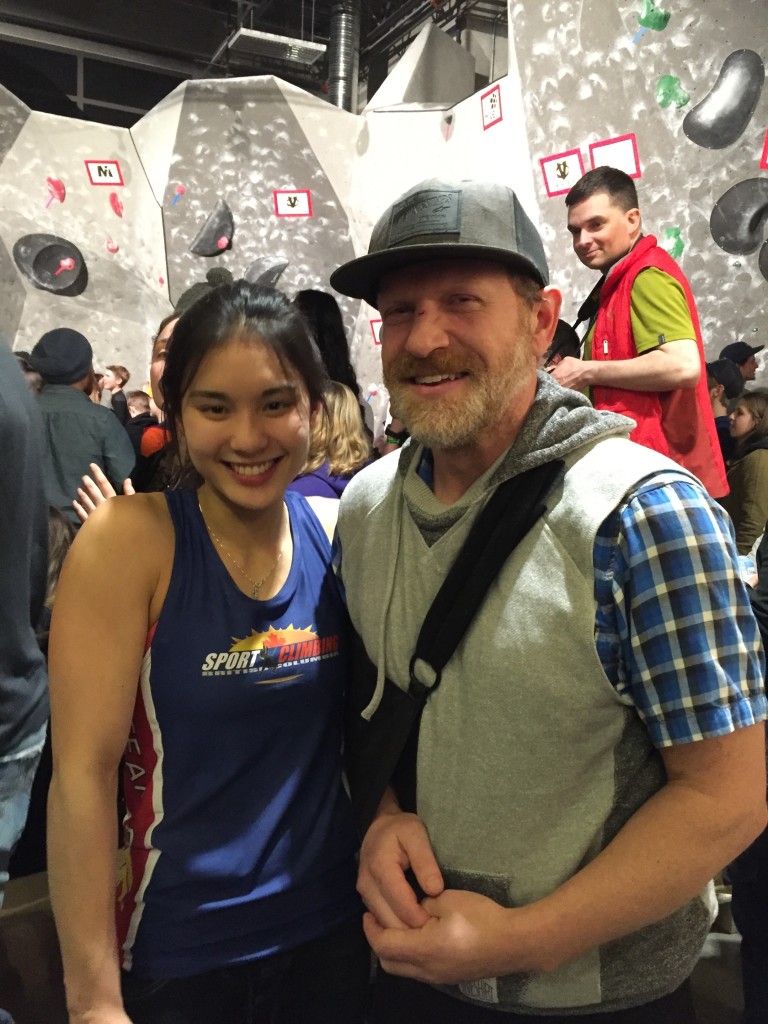
Andrew Wilson with Alannah Yip. Photo courtesy of SCM ©
This season really seemed on fire. What do you think contributed to the success of this years events?
Great route-setting, deep fields and a really positive competitive atmosphere.
Competition climbing in BC seems to be moving in the right direction and cashing in on the excitement of a growing sport. How do you see the competition scene moving forward from this point?
BCs legacy for the next 10 years looks really good. There are passionate, dedicated coaches, officials and athletes at all levels showing the next generation the way.
I want to get a bit into your background and how you found yourself in the coaching role. You have long been a force in the BC climbing scene as a climber and coach. How did it all start?
I took a job teaching belaying at the Edge when it opened in 1992 to help pay for my studies at UBC (I studied coaching and exercise science). I had been climbing 5 or so years, but only outside and was mostly a weekend warrior. I was already involved in coaching youth hockey, soccer and competitive swimming. I volunteered to help at the first North American Youth Championships at the Edge in 1993 (I think). It blew me away. I knew I had to get more involved and use what I was studying to help myself and other climbers get better. I worked my way into a coaching role at the Edge and then in 1998 the National Youth Team coaching gig as well. It was exciting. The sport was so young globally and in North America. I felt like there was lots of opportunity to cut new ground, try things and progress the sport.
In those early days as an Edge coach with Mike Doyle, did you guys know what you were doing or were you learning as you went?
I had a background in coaching to draw on but honestly we did a lot of experimenting with training methods. Mike was invaluable as a coaching partner because he had been at the world cup level and I used him to vet a lot of the experimental training methods, not to mention that he is such a dedicated passionate guy. We always had a very similar vision for where we wanted the National Team program to go.
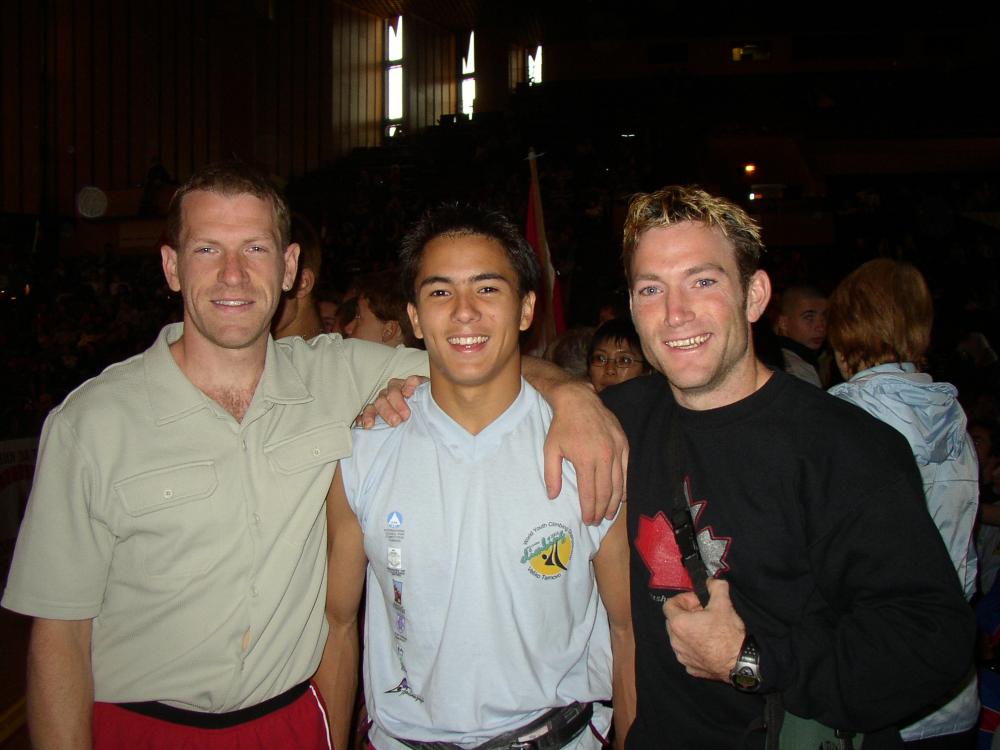
Andrew, Sean McColL, and Mike Doyle, World Junior Championships, Bulgaria 2003. Photo courtesy of Mike Doyle ©
That Edge team created a number of top athletes including Sean McColl, Will Stanhope, Simon Parton, etc. How much does that have to do with the athlete themselves or the training they receive when they are younger?
I am a huge believer in fundamentals before performance and passion before expectation. I also believe that coaching is about creating a culture and environment that fosters the pursuit of personal performance. It is less about x’s and o’s and more about relationships and getting to really know your athletes.
The athletes that came out of The Edge not only had physical prowess, they also were great ambassadors to the sport. Do you take this into consideration when working with younger climbers and focus on keeping them grounded?
I’d like to think we worked hard to make sure our athletes were respectful, compassionate people before anything. The fact that so many of my former athletes are still involved either competing, coaching, judging or otherwise is my biggest source of pride. Far more than any of the achievements these athletes may have accomplished (not that I’m not proud of these as well ☺).
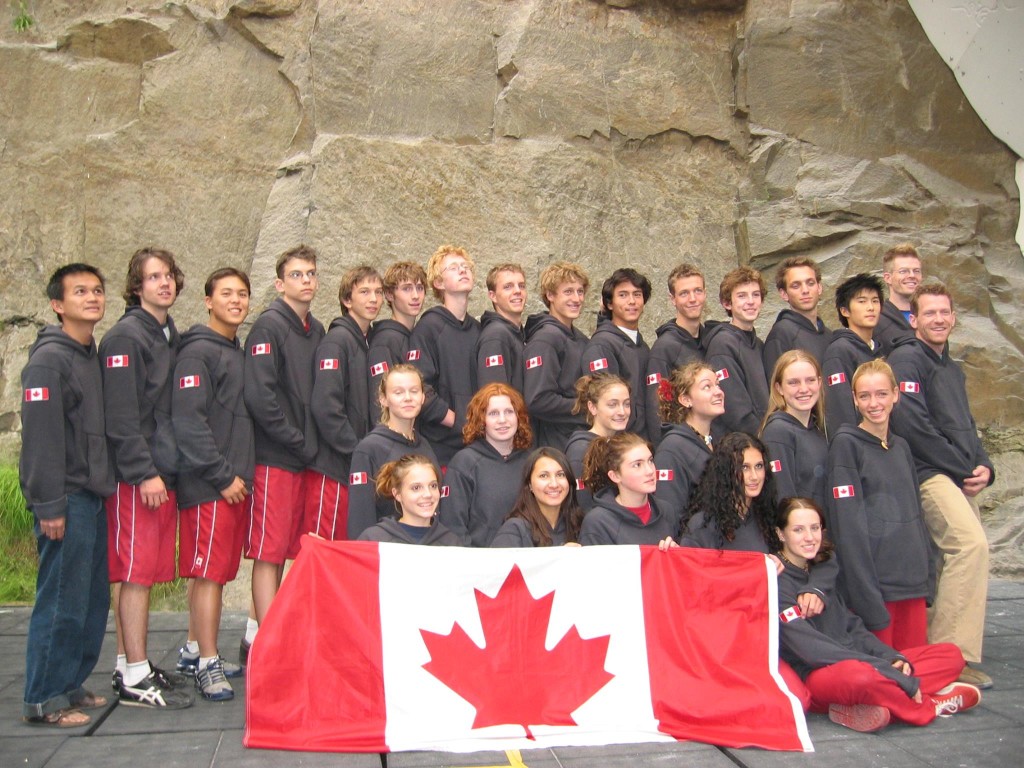
Canadian National Team Scotland 2004. Photo courtesy of Matt Johnson ©
You have coached at a number of different venues around BC. What keeps you motivated?
I love the process of getting to know an athlete, what makes him or her tick and then using that knowledge to help them grow as a person and an athlete. I also enjoy being around athletes. I feel comfortable in that environment and enjoy the places it takes me both physically, emotionally and otherwise.
Have you ever thought about offering services online, building programs for other climbers out there trying to find an edge up?
I have thought about it, but for me, I need to be with an athlete in person, see them climb, hear them talk about what’s working and what’s not. I’m a movement analyst at heart and I really need to see an athlete in person to pick up on the subtle changes in movement that will help them improve.
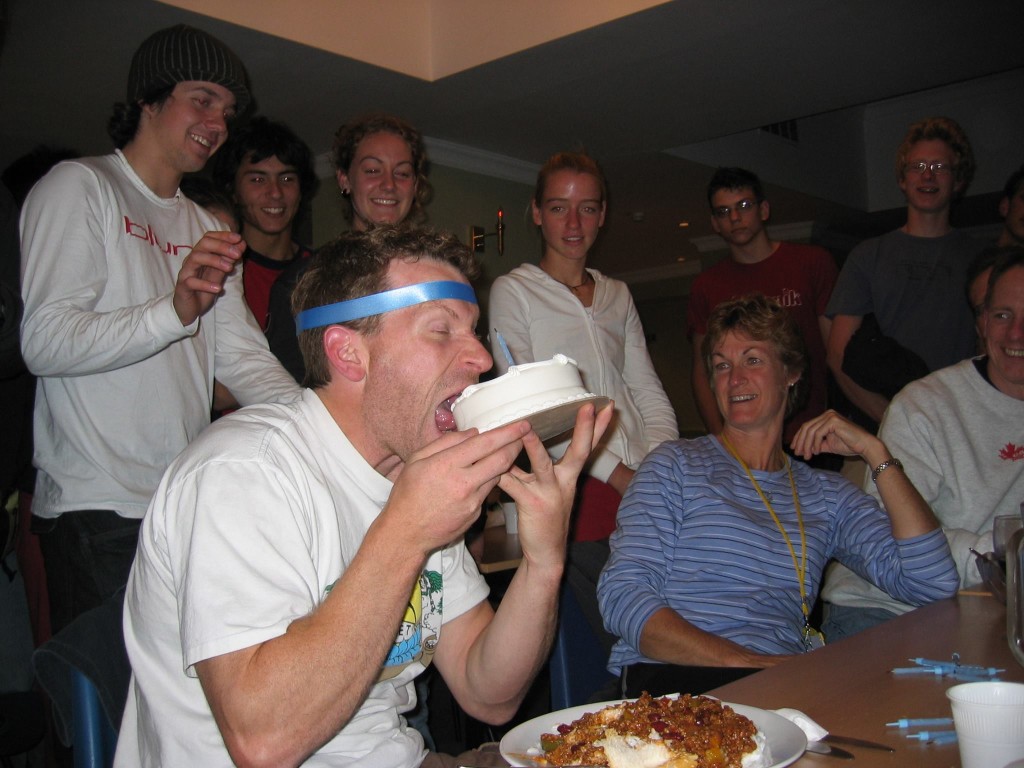
Photo courtesy of Matt Johnson ©
When approaching climbing and coaching, do you have any philosophies or beliefs that guide your process?
Coaching is about relationships. I believe my athletes need to know deep down in their hearts that I value each and every one of them for who they are as a person, not what they can do as an athlete. Once that trust is established, the rest is relatively easy.
I also believe strongly that climbing is a movement based sport. Consequently, I preach fundamentals and tactical training ahead of physical training. Lastly, I believe that the value of sport is not the medals, results and championships, but in what you learn about yourself along the way. Sport is my anchor. It is the constant in my life that is always there and keeps me going through tough times. I think athletes who pursue personal performance learn this along the way.
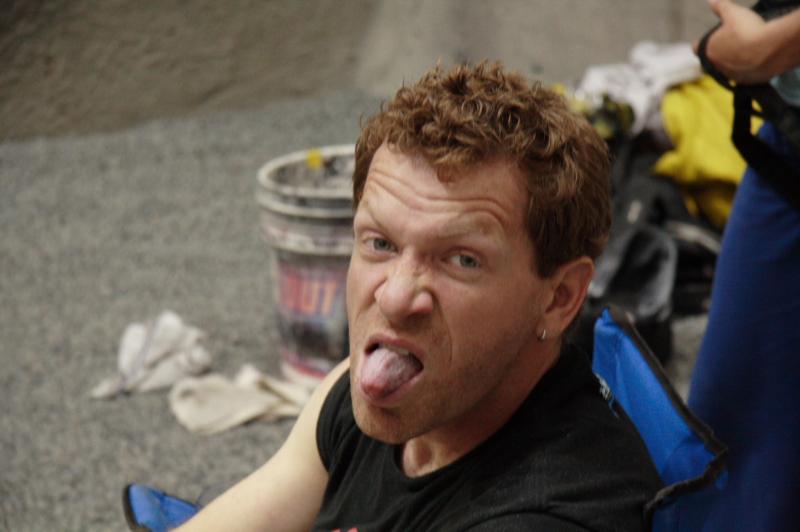
Andrew embracing his geekdom. Photo courtesy of Mike Doyle ©
I want to talk a little about the Climb Base5 Open team. How did the idea of a team like this come up?
For years, I have watched my athletes reach 19 years old and have to leave the youth team/ circuit without any support to continue their development in the sport. I wanted to be a part of something that would provide the missing support for these athletes. It took the encouragement from several athletes, gym owners, and others to get me off my butt!
You folks interviewed people who were right for the team. How does the team concept play into the role of such an individual pursuit?
I believe individual performance is a product of culture and environment. We wanted to make sure the athletes were ready to be supportive, contributing members to the culture of the team (this isn’t to say that those not selected weren’t ready. This was not the only criteria for team selection).
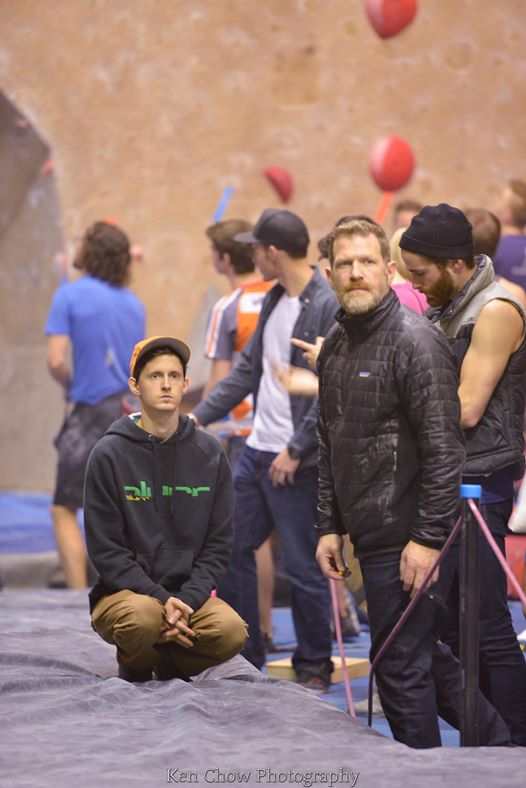
Andrew with Simon Parton. Photo courtesy of Ken Chow ©
You are working with Matt Johnson who was once your pupil. How has it been working in concert with Matt and how have you learned from the process?
It’s been amazing. I have known Matt for so long, it feels easy to communicate with him. He has worked really hard over the past five years or so to develop his coaching abilities. I’m constantly learning from him and hope he’d say the same.
You are still travelling to the island a few times a week. Is there a huge difference coaching for bouldering vs lead climbing?
I coach both bouldering and lead in Saanich. I believe athletes should not specialize too early in only one discipline. Bouldering training makes lead climbers stronger ad lead training teaches the boulderer to be more efficient, move better and gives them the stamina to train longer.

Andrew on Jesus Save the Pushers. Photo courtesy of Mike Doyle ©
Your own climbing has taken a backseat to coaching and kids. Do you still get out there on rock every now and then?
Yes! The last year has been tough. I dislocated my shoulder last January and have been unable to climb, but other sports take over. I ride, ski, skimboard and whatever else my kids wanna do.
With so many people training, there has been a lot of talk about periodization training. Can you tell us about this concept from your perspective?
Periodized training is pretty simple for me. Analyze the performance requirements for a given sport, break them down into components and then train simple to complex in an order that allows each subsequent training phase to build on what was improved in the last (train technical changes, individual movement patterns, strength, speed, power, stamina, then sport performance). The number of periods in a year depends on the number of different events/ disciplines (and therefore different physical demands) and event scheduling (how long between changes in demands).
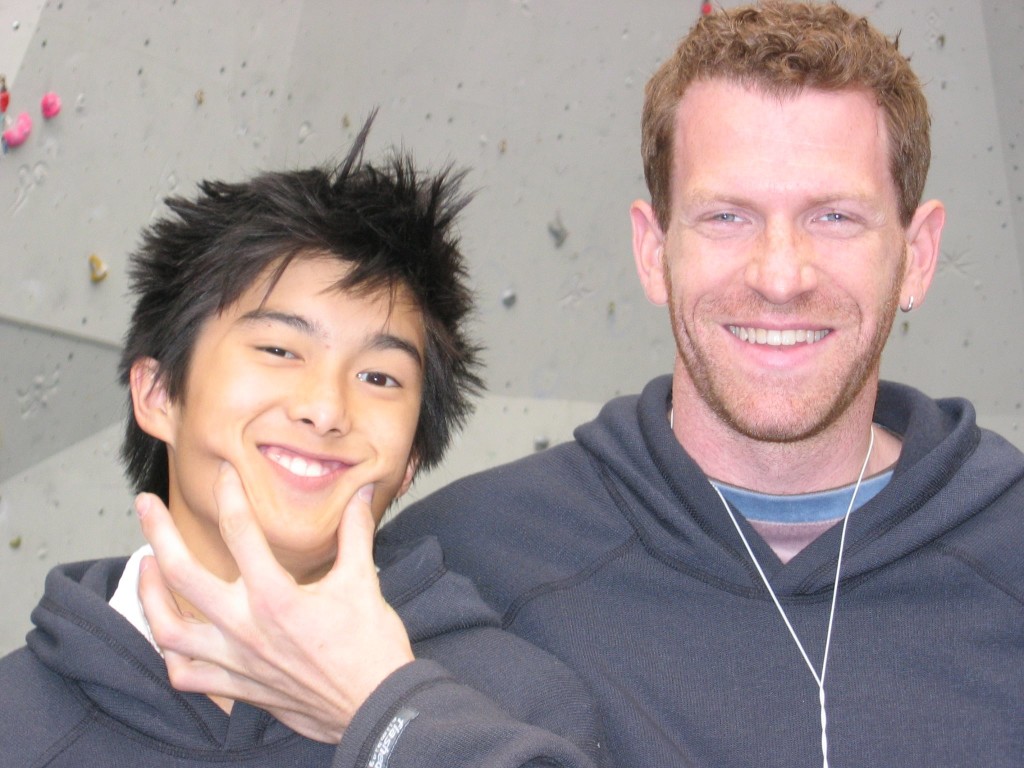
Andrew Wilson with a young JJ Mah. Photo courtesy of Matt Johnson ©
How do you balance needs such as strength and power endurance when training athletes?
Tough question. Depends on the athlete and the disciplines they compete in.
How much emphasis do you put into technical weaknesses when evaluating a climbers strengths and challenges?
A lot. This is what separates good from great. Good athletes work on what they like to do, what they are good at. Great athletes work on both areas of strength and areas of relative weakness.
How do you think the the ‘Open Team’ contributed to the overall competition experience in BC?
I’d like to think they are driving the bus. Helping inspire the next generation. Showing that BC athletes can continue to train and be committed to competition performance AND go to school, work, etc….that is doesn’t have to end at 19.
Thanks so much for taking the time to chat with us. I know that you have influenced the culture of competition climbing in BC in a major way over the years and special thanks for your ongoing contributions to the sport and we are looking forward to see where things are going.

Getting hydrated before a team meeting in Bulgaria, 2003. Photo courtesy of Mike Doyle ©
Andrew Wilson coaches at Climb Base5 in Coquitlam, BC and The Boulders in Sanaach, BC
Special thanks to Mike Doyle and Matt Johnson for digging deep in the vault and providing us with some photos. Special thanks to Ken Chow for his current photos.











